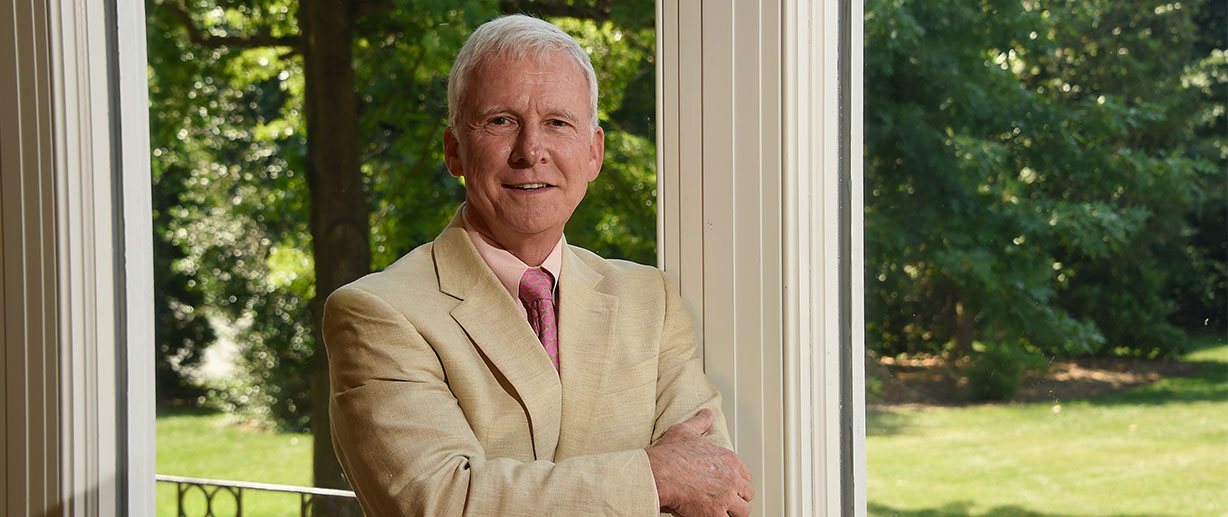Dr. David Wood began his career at Wofford College by shepherding the Terriers into the Southern Conference at the dawn of the NCAA Division I era. He capped it by leading a comprehensive campaign that netted more than $470 million in gifts and pledges. In between, he helped implement the college’s plan to carefully grow enrollment.
Now Wood, the senior vice president for advancement, has announced his retirement after 24 years of service. He previously served as director of athletics, senior vice president for planning and as provost.
Calhoun Kennedy ’89, executive director for advancement, will serve as interim, and Wood will remain connected to the college during a national search for his replacement.
“David has served the college with distinction, integrity and grace,” says President Nayef Samhat. “He has been a true servant leader who has worked in whatever capacity the college needed most. His influence has been transformational.”
Wood arrived in 1997, serving as director of athletics. Wofford had made the jump to NCAA Division I two years earlier, and Wood helped steer the Terriers’ entrance into the Southern Conference.
“Prior to my coming here, Wofford, in my opinion, made one of the boldest decisions in the history of liberal arts colleges by choosing to move up to Division I athletics,” Wood says. “There was a natural skepticism, and there should have been. Obviously, we demonstrated that we could do it, and I was just delighted to play a small role in all of what has occurred here.”
Starting in 2002, Wood helped put together a plan to slowly grow the college’s enrollment. At the time, Wofford had 1,050 students. The plan called for incremental increases – first to 1,250 students, then 1,450 and 1,600.
“At the time that was very important for Wofford,” Wood says. “The average enrollment of the top 50 liberal arts colleges was 1,903 undergraduates, so we were a real outlier on the smallish side. Programmatically and financially, that made things more difficult.”
Wood became provost during the growth phase. He says working with faculty and creating new programs during that time was “very rewarding.”
His final act was leading the college’s Office of Advancement and the “For Wofford” campaign. The campaign yielded five new buildings, the renovation and improvement of several other facilities and 189 new endowed scholarships and funding to support experiential learning and campus renovations. It was topped off by a $150 million gift to the endowment from Jerry Richardson ’59.
“There’s an old saying about liberal arts colleges given all the changes in the landscape: Are they thriving, surviving or endangered,” Wood says. “Some are endangered, and in fact some have closed. You don’t want to just survive, you want to thrive. I leave with a confidence that Wofford is thriving and will continue to do so.”
Kennedy praises Wood’s commitment to the college.
“I have really enjoyed working with David, especially during the ‘For Wofford’ campaign,” Kennedy says. “His fingerprints are all over campus, from projects he personally handled to the impactful gifts facilitated with key donors.”
Lisa Goings, director of advancement operations, says working with Wood has been a “wonderful experience.”
“David has a great passion for higher education and enhancing the experience of all students at Wofford,” Goings says. “I think that was clearly demonstrated during the ‘For Wofford’ campaign.”
Wood says he and his wife, Judy, plan to do a lot of traveling and spending time with their three sons, Shiel ’05 and twins Leland ’08 and John ’08. Shiel is an assistant football coach at West Point, and Wood says he’s looking forward to watching his first Army-Navy game. John works in Munich, Germany, as senior business development manager for the Virginia Department of Commerce, and Leland is a librarian for the medical library at the Edward Via College of Osteopathic Medicine in Spartanburg.
Although he says now is the right time to walk away, Wood says Wofford will always have a place in his heart.
“The real joy for me has been the people who work here, the students who attend here and the alumni base that I’ve gotten the opportunity to know so well,” Wood says. “They’re just really outstanding people of quality and character, and it’s been a blessing for my family.
“Wofford is both a place and an idea. The former, the place, locates us in a distinctive residential community to live, to study, to work and to play, and as a result, to flourish. The latter, the idea, is the essence of why Wofford needs to thrive. Our republic must have thoughtful citizen leaders educated in the liberal arts who are committed to doing good in the world. The place and the idea have provided meaning and fulfillment for me, something for which I am forever grateful.”
